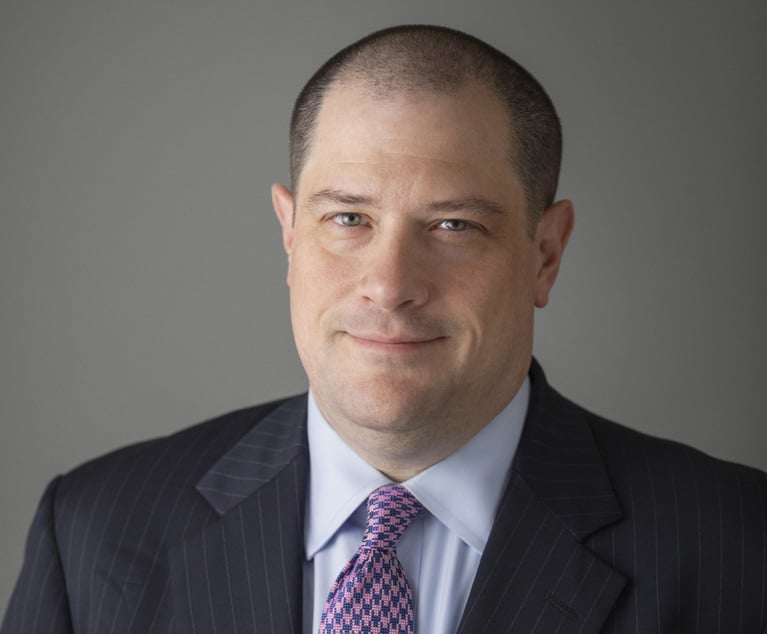 Naomi Osaka, professional tennis player from Japan. (Photo: Shutterstock.com)
Naomi Osaka, professional tennis player from Japan. (Photo: Shutterstock.com)Will It Be 'Game-Set-Match' for Women's Sports?
A U.S. Supreme Court transgender discrimination case could carry unintended consequences for female athletes, the authors argue.
September 04, 2019 at 04:45 PM
4 minute read
This fall, the U.S. Supreme Court takes up the case of R.G. & G.R. Harris Funeral Homes v. EEOC. The case involves the contours of Title VII's prohibition on sex discrimination in employment, but will have broad implications for women and girls who participate in competitive sports.
The specific dispute before the high court arose in 2013, when a funeral home employee known as Anthony Stephens told the company's owner that, after scheduled time off, he would return to work as Aimee Stephens and use female pronouns. The owner of the funeral home decided to terminate his professional relationship with Stephens.
Stephens sued, alleging that the funeral home violated Title VII of the Civil Rights Act's prohibition on sex-based discrimination. A lower court initially held that Stephens could not sue on the basis of transgender status because the statute does not identify transgender status or gender identity as a protected class. The U.S. Court of Appeals for the Sixth Circuit reversed, holding that the employee's decision to fire Stephens was "because of sex" and, therefore, unlawful.
The Supreme Court is scheduled to hear oral arguments in the case in October.
An Unintended Consequence?
As an organization committed to equal opportunity, Independent Women's Forum is concerned that any ruling expanding the statutory meaning of "sex" to include transgender status will have the unintended consequence of reducing opportunities for female athletes. IWF's Center for Law and Liberty has, therefore, filed a friend-of-the-court brief in support of the employer.
When Congress passed Title VII in 1964, it banned employers from treating an individual less favorably than similarly situated individuals of the opposite biological sex. Congress did not address the issue of discrimination because of an individual's gender identity or transgender status.
Eight years later, Congress enacted Title IX to prohibit sex discrimination in education. Title IX has been instrumental in expanding athletic opportunities for women and girls. The explosion in women's sports since 1972 is due, at least in part, to the law's requirement that schools provide equal opportunities for male and female athletes to play sports.
Because courts generally interpret similar language in Title IX the same way as Title VII, a ruling that interprets the employment statute broadly to include transgender status and/or gender identity will apply not only to employment, but also to education, including athletics.
Such an interpretation will mandate unrestricted participation in women's sports by male-to-female transgender athletes and will, inevitably, reduce the number of opportunities for biological women and girls. That is because individuals born male are, on average, physiologically stronger, bigger and faster than those born female.
If athletes born male are allowed to compete on women's teams and in women's divisions of sport, there will, quite simply, be fewer roster spots for biological females and fewer opportunities for biological females to win competitions and secure scholarships.
In the long run, a ruling interpreting "sex" to include gender identity will undermine the legal justification for maintaining any sex-specific athletic teams at all and could, logically, result in the elimination of women's sports altogether. Indeed, some activists hope for just such a result, arguing that sex is a social construct and that sex-segregation in sport is inherently unjust and should be illegal. But is there any doubt that without sex-specific sport, the majority of athletic opportunities would go to men? Title IX was not passed to achieve such a result.
Transgender participation in competitive athletics presents complicated issues that are not easily resolved by blunt, one-size-fits-all judicial decrees. But, if the Supreme Court interprets federal anti-discrimination law to prohibit distinctions on the basis of transgender status, it will impose just such a decree—without consideration of context or circumstance—on businesses, schools, and athletic associations across the entire country.
Policymaking bodies, not the courts, are best suited to address complicated social issues, such as these. In the U.S. Congress, such deliberations are, in fact, ongoing. The Supreme Court should not interfere with the deliberative, democratic process and risk eliminating athletic opportunities for women and girls.
Jennifer C. Braceras is the director of the Center for Law & Liberty at Independent Women's Forum. Anita Y. Milanovich, attorney at Milanovich Law, has litigated constitutional issues for 15 years and is counsel of record for IWF's brief.
This content has been archived. It is available through our partners, LexisNexis® and Bloomberg Law.
To view this content, please continue to their sites.
Not a Lexis Subscriber?
Subscribe Now
Not a Bloomberg Law Subscriber?
Subscribe Now
NOT FOR REPRINT
© 2024 ALM Global, LLC, All Rights Reserved. Request academic re-use from www.copyright.com. All other uses, submit a request to [email protected]. For more information visit Asset & Logo Licensing.
You Might Like
View All
Protecting Attorney-Client Privilege in the Modern Age of Communications
6 minute read

Lingering Questions at Supreme Court About Climate Change Litigation Need Resolution
6 minute read
Trending Stories
- 1The Impact of Erlinger on Predicate Felony Sentencing Statutes
- 2To Ease Partner Pay Tensions, Some Law Firms Are Seeking 'Middle Ground' in Transparency
- 3How Legal Aid and Tech Collaboration Can Bridge the Justice Gap
- 4The Rise of AI-Generated Deepfakes: A New Cybersecurity Threat for Law Firms
- 5Litigation Leaders: Labaton’s Eric Belfi on Running Case Investigation, Analysis and Evaluation In-House
Who Got The Work
Michael G. Bongiorno, Andrew Scott Dulberg and Elizabeth E. Driscoll from Wilmer Cutler Pickering Hale and Dorr have stepped in to represent Symbotic Inc., an A.I.-enabled technology platform that focuses on increasing supply chain efficiency, and other defendants in a pending shareholder derivative lawsuit. The case, filed Oct. 2 in Massachusetts District Court by the Brown Law Firm on behalf of Stephen Austen, accuses certain officers and directors of misleading investors in regard to Symbotic's potential for margin growth by failing to disclose that the company was not equipped to timely deploy its systems or manage expenses through project delays. The case, assigned to U.S. District Judge Nathaniel M. Gorton, is 1:24-cv-12522, Austen v. Cohen et al.
Who Got The Work
Edmund Polubinski and Marie Killmond of Davis Polk & Wardwell have entered appearances for data platform software development company MongoDB and other defendants in a pending shareholder derivative lawsuit. The action, filed Oct. 7 in New York Southern District Court by the Brown Law Firm, accuses the company's directors and/or officers of falsely expressing confidence in the company’s restructuring of its sales incentive plan and downplaying the severity of decreases in its upfront commitments. The case is 1:24-cv-07594, Roy v. Ittycheria et al.
Who Got The Work
Amy O. Bruchs and Kurt F. Ellison of Michael Best & Friedrich have entered appearances for Epic Systems Corp. in a pending employment discrimination lawsuit. The suit was filed Sept. 7 in Wisconsin Western District Court by Levine Eisberner LLC and Siri & Glimstad on behalf of a project manager who claims that he was wrongfully terminated after applying for a religious exemption to the defendant's COVID-19 vaccine mandate. The case, assigned to U.S. Magistrate Judge Anita Marie Boor, is 3:24-cv-00630, Secker, Nathan v. Epic Systems Corporation.
Who Got The Work
David X. Sullivan, Thomas J. Finn and Gregory A. Hall from McCarter & English have entered appearances for Sunrun Installation Services in a pending civil rights lawsuit. The complaint was filed Sept. 4 in Connecticut District Court by attorney Robert M. Berke on behalf of former employee George Edward Steins, who was arrested and charged with employing an unregistered home improvement salesperson. The complaint alleges that had Sunrun informed the Connecticut Department of Consumer Protection that the plaintiff's employment had ended in 2017 and that he no longer held Sunrun's home improvement contractor license, he would not have been hit with charges, which were dismissed in May 2024. The case, assigned to U.S. District Judge Jeffrey A. Meyer, is 3:24-cv-01423, Steins v. Sunrun, Inc. et al.
Who Got The Work
Greenberg Traurig shareholder Joshua L. Raskin has entered an appearance for boohoo.com UK Ltd. in a pending patent infringement lawsuit. The suit, filed Sept. 3 in Texas Eastern District Court by Rozier Hardt McDonough on behalf of Alto Dynamics, asserts five patents related to an online shopping platform. The case, assigned to U.S. District Judge Rodney Gilstrap, is 2:24-cv-00719, Alto Dynamics, LLC v. boohoo.com UK Limited.
Featured Firms
Law Offices of Gary Martin Hays & Associates, P.C.
(470) 294-1674
Law Offices of Mark E. Salomone
(857) 444-6468
Smith & Hassler
(713) 739-1250









